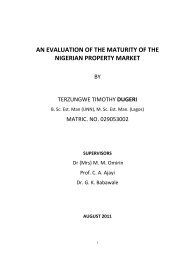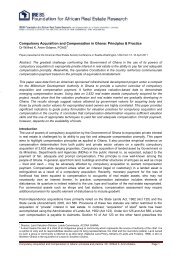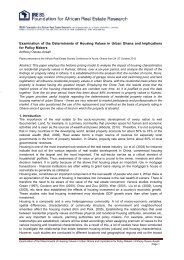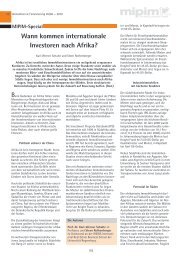You also want an ePaper? Increase the reach of your titles
YUMPU automatically turns print PDFs into web optimized ePapers that Google loves.
Trademarks Act. There are public registries for trademarks,industrial designs and patents. Zimbabwe is a signatory to theBerne and Paris Conventions.Financial Services/InsuranceThere are several international and locally owned banksoperating in the country. There are also several buildingsocieties established to provide mortgage finance. There aremany insurance and reinsurance companies operating inZimbabwe.Key Strategic Growth Initiatives by Government/Private SectorThe Government is making significant investments ininfrastructural developments in power generation, roadinfrastructure (entailing the dualisation of major roads) and theconstruction of bridges. It is also working on upgrading airportsand has committed over $33 million towards thesedevelopments. Government is actively seeking private partnersin these areas. Government has also committed over $252million towards supporting the agricultural sector.Treaties and Bilateral AgreementsZimbabwe signed a Bilateral Investment Promotion andProtection Agreement with South <strong>Africa</strong> in November 2009 andis actively seeking regional partners for similar agreements.Zimbabwe is a member of the Common Market for Eastern andSouthern <strong>Africa</strong> (COMESA) Customs Union and Southern <strong>Africa</strong>nDevelopment Community (SADC) agreement on tariffs andtrade.Membership of International and Regional OrganisationsZimbabwe is a member of SADC, COMESA, the <strong>Africa</strong>n Union,United Nations, World Bank and International Monetary Fund.Road and TransportThe road and rail infrastructure has deteriorated significantlydue to lack of investment by Government. Government isworking on upgrading the infrastructure by dualising roads andreviving and upgrading the rail network. Private sector partnersare being sought to partner the Government in these areas.WaterGovernment is investing significant sums to support localauthorities in the provision of water supplies. Governmentrecently decentralized water services to local authorities havingshortly experimented with centralizing it via the creation of anational water authority. Water supplies are erratic in most citiesand towns and many people resort to borehole water supply fordomestic and commercial purposes.EnergyEnergy supplies remain critically low and power shortages andcuts are affecting manufacturing industries, agriculture,commerce and domestic consumption. Power supplies arebelow 50% of the national demand. Private sector partners arebeing sought for independent power supplies.TelecommunicationsGovernment has committed over $6 million to the state ownedtelecommunication corporation for the creation of a fibre opticlink and further resources for the installationof new radio transmitters.manufacturing sector which is operating at less than 30% of itscapacity.Trade and IndustryThe main trading partner remains South <strong>Africa</strong>. The industrialsector remains depressed due to scarcity of capital on the localmarket and the absence of foreign direct investment and lines ofcredit from external sources. A ministry specifically responsiblefor trade and industry was established by Government to revivethe sector.Information and Communications TechnologyA ministry focusing specifically on this aspect was recentlyestablished and a new law governing information andcommunications technology is being discussed in parliament.The government has already started investing in the creation offibre optic networks but the levels of investments remain verylow. Private sector players are required to complementGovernment efforts.MiningMining is becoming the largest contributor to the country’s grossdomestic product (GDP). In addition to the gold and chromewhich the country has traditionally produced, platinum anddiamonds are fairly recent discoveries which are dominating thesector.AgricultureThe country has not yet realized the benefits of the land reformprogram with productivity still very low despite significantinvestment by government.Trade and InvestmentGovernment has set up several corporations to promoteinvestment in industry. The small enterprises developmentcorporation was set up to specifically assist the establishment ofsmall businesses, while a bank to support infrastructuraldevelopment also exists. A central one stop investmentauthority is being established to promote foreign directinvestment and remove bottlenecks in the regulatory system.Labour RelationsZimbabwe has a huge pool of labour with 80% of the populationunemployed in the formal sector. Labour relations are regulatedby a labour law with a dedicated court and other structures setup to deal exclusively with labour issues.Significant Country Issues for Investors to ConsiderThere are many investment opportunities as a result of thecountry’s emergence from years of economic decline and thenear collapse of most industries. The country is trying to attractforeign capital to boost economic development. The majornegative factor has been the political environment. Even thoughthis has not completely stabilised, there are encouraging signswith the establishment of the Government of National Unity.The country’s indigenisation policies (requiring 51% indigenousownership) must also be taken into account.88Key Industry SectorsThe main industry sectors are agriculture,mining, telecommunications, and financialservices. There are huge opportunities in the










